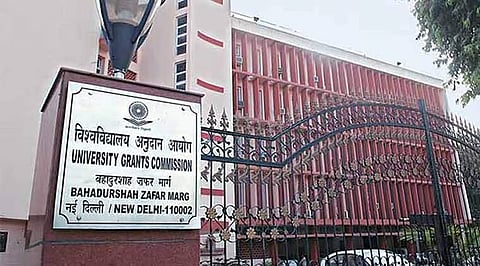

The University Grant Commission (UGC) has dissolved the UGC - Consortium for Academic and Research Ethics (CARE). In its place, the commission has developed suggestive parameters for choosing peer-reviewed journals by faculty members and students, which have been placed in the public domain for their feedback till February 25.
The decision was taken in the UGC’s 584th meeting, held on October 3, 2024, based on the recommendations of an expert committee, as notified in an official UGC notice dated February 11.
What was the UGC-CARE List?
Introduced in 2018, the UGC-CARE list aimed to ensure that only reputable journals were recognised for faculty selections, promotions, and research funding applications. It was created in response to concerns about the quality of research publications and the prevalence of predatory journals.
Criticisms and challenges faced by researchers
UGC Chairman Prof M Jagadesh Mamidala said that despite its intended purpose, the UGC-CARE list faced several criticisms:
-Over-centralisation: The decision-making process on journal quality was concentrated within a single authority.
-Delays and inefficiency: Inclusion or exclusion of journals from the list was often slow and inconsistent.
-Predatory journals: Despite efforts, some low-quality or predatory journals managed to enter the list.
-Lack of transparency: The criteria for the selection and exclusion of journals were unclear.
-Exclusion of Indian language journals: Several well-respected academic journals published in Indian languages were left out.
-Uncertainty for researchers: The sudden removal of journals from the list left researchers in difficult positions, especially those who had already published their work in those journals.
Moreover, the National Education Policy (NEP) 2020 also highlighted the inefficacy of over-regulation in academic publishing. It criticised the heavy concentration of decision-making power in centralised bodies and called for more institutional autonomy in research evaluation.
The decision to dissolve UGC-CARE
In December 2023, UGC set-up an expert committee to review the UGC-CARE scheme, informed the UGC chairman.
The committee found that the UGC-CARE model introduced subjectivity in journal assessment, particularly affecting non-Science, Technology, Engineering and Mathematics (STEM) disciplines. Based on these findings, the UGC unanimously decided to discontinue the list and recommended that HEIs develop their own credible mechanisms for evaluating research publications.
The new approach
With the discontinuation of the UGC-CARE list, higher education institutions (HEIs) are now responsible for establishing their own evaluation mechanisms for research journals. These mechanisms must align with academic norms and the indicative parameters suggested by the UGC.
Under the new system, researchers are no longer constrained by a centralised list of approved journals. Moreover, institutions can tailor their evaluation models to suit specific disciplines, including newer and rapidly evolving fields.
HEIs must ensure that only high-quality, ethical journals are recognised, placing greater accountability on institutions, added the UGC Chairman.
Institutions now have the autonomy to:
- Recognise journals that best align with their disciplines and research needs.
- Accommodate emerging fields that may not have been acknowledged under traditional evaluation models.
- Take ownership of maintaining high scholarly standards.
